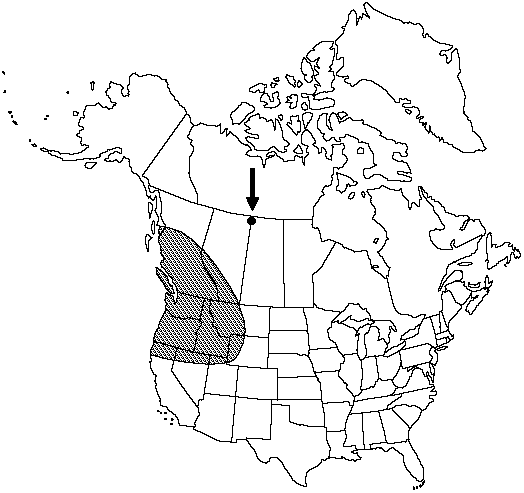Difference between revisions of "Woodsia oregana subsp. oregana"
Endemic
Treatment appears in FNA Volume 2.
FNA>Volume Importer |
imported>Volume Importer |
||
| (7 intermediate revisions by 2 users not shown) | |||
| Line 3: | Line 3: | ||
|accepted_authority=D. C. Eaton | |accepted_authority=D. C. Eaton | ||
|publications= | |publications= | ||
| + | |special_status={{Treatment/ID/Special_status | ||
| + | |code=E | ||
| + | |label=Endemic | ||
| + | }} | ||
|basionyms= | |basionyms= | ||
|synonyms= | |synonyms= | ||
| Line 12: | Line 16: | ||
}}<!-- | }}<!-- | ||
| − | --><span class="statement" id="st- | + | --><span class="statement" id="st-undefined" data-properties=""><b>Cells </b>on pinnule margins regular in shape, margins appearing entire; adaxial epidermal cells averaging less than 120 µm. <b>Spores</b> averaging 39–45 µm. <b>2n</b> = 76.</span><!-- |
-->{{Treatment/Body | -->{{Treatment/Body | ||
| + | |phenology=Sporulating summer–fall. | ||
|habitat=Cliffs and rocky slopes, usually on granitic or volcanic substrates | |habitat=Cliffs and rocky slopes, usually on granitic or volcanic substrates | ||
|elevation=100–2800 m | |elevation=100–2800 m | ||
|distribution=Alta.;B.C.;Sask.;Calif.;Idaho;Mont.;Nev.;Oreg.;Utah;Wash.;Wyo. | |distribution=Alta.;B.C.;Sask.;Calif.;Idaho;Mont.;Nev.;Oreg.;Utah;Wash.;Wyo. | ||
| − | |discussion=<p>The leaves of Woodsia oregana subsp. oregana tend to be narrower and less glandular than those of subsp. cathcartiana. The two subspecies hybridize in the narrow region of sympatry; hybrids are sterile triploids with malformed spores.</p> | + | |discussion=<p>The leaves of <i>Woodsia oregana </i>subsp.<i> oregana</i> tend to be narrower and less glandular than those of <i></i>subsp.<i> cathcartiana</i>. The two subspecies hybridize in the narrow region of sympatry; hybrids are sterile triploids with malformed spores.</p> |
|tables= | |tables= | ||
|references= | |references= | ||
| Line 27: | Line 32: | ||
-->{{#Taxon: | -->{{#Taxon: | ||
name=Woodsia oregana subsp. oregana | name=Woodsia oregana subsp. oregana | ||
| − | |||
|authority=D. C. Eaton | |authority=D. C. Eaton | ||
|rank=subspecies | |rank=subspecies | ||
| Line 34: | Line 38: | ||
|basionyms= | |basionyms= | ||
|family=Dryopteridaceae | |family=Dryopteridaceae | ||
| + | |phenology=Sporulating summer–fall. | ||
|habitat=Cliffs and rocky slopes, usually on granitic or volcanic substrates | |habitat=Cliffs and rocky slopes, usually on granitic or volcanic substrates | ||
|elevation=100–2800 m | |elevation=100–2800 m | ||
| Line 40: | Line 45: | ||
|publication title= | |publication title= | ||
|publication year= | |publication year= | ||
| − | |special status= | + | |special status=Endemic |
| − | |source xml=https:// | + | |source xml=https://bitbucket.org/aafc-mbb/fna-data-curation/src/2e0870ddd59836b60bcf96646a41e87ea5a5943a/coarse_grained_fna_xml/V2/V2_274.xml |
|genus=Woodsia | |genus=Woodsia | ||
|species=Woodsia oregana | |species=Woodsia oregana | ||
|subspecies=Woodsia oregana subsp. oregana | |subspecies=Woodsia oregana subsp. oregana | ||
| − | |||
| − | |||
| − | |||
}}<!-- | }}<!-- | ||
-->[[Category:Treatment]][[Category:Woodsia oregana]] | -->[[Category:Treatment]][[Category:Woodsia oregana]] | ||
Latest revision as of 20:22, 5 November 2020
Cells on pinnule margins regular in shape, margins appearing entire; adaxial epidermal cells averaging less than 120 µm. Spores averaging 39–45 µm. 2n = 76.
Phenology: Sporulating summer–fall.
Habitat: Cliffs and rocky slopes, usually on granitic or volcanic substrates
Elevation: 100–2800 m
Distribution

Alta., B.C., Sask., Calif., Idaho, Mont., Nev., Oreg., Utah, Wash., Wyo.
Discussion
The leaves of Woodsia oregana subsp. oregana tend to be narrower and less glandular than those of subsp. cathcartiana. The two subspecies hybridize in the narrow region of sympatry; hybrids are sterile triploids with malformed spores.
Selected References
None.
Lower Taxa
None.